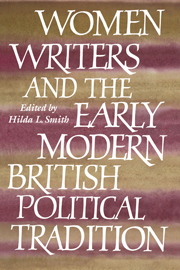Book contents
- Frontmatter
- Contents
- List of contributors
- Preface
- Introduction: Women, intellect, and politics: their intersection in seventeenth-century England
- Part I Women's political writings, 1400–1690
- Part II Women's political and philosophical writings, 1690–1800
- Introduction to Part II
- 5 Astell, Masham, and Locke: religion and politics
- 6 The politics of sense and sensibility: Mary Wollstonecraft and Catharine Macaulay Graham on Edmund Burke's Reflections on the Revolution in France
- 7 Mary Wollstonecraft on sensibility, women's rights, and patriarchal power
- 8 Emilie du Châtelet: genius, gender, and intellectual authority
- Part III The intellectual context and economic setting for early modern women
- Part IV Early modern legal and political prescriptions for women
- Conclusion: women's writing, women's standing: theory and politics in the early modern period
- Index
7 - Mary Wollstonecraft on sensibility, women's rights, and patriarchal power
from Part II - Women's political and philosophical writings, 1690–1800
Published online by Cambridge University Press: 04 August 2010
- Frontmatter
- Contents
- List of contributors
- Preface
- Introduction: Women, intellect, and politics: their intersection in seventeenth-century England
- Part I Women's political writings, 1400–1690
- Part II Women's political and philosophical writings, 1690–1800
- Introduction to Part II
- 5 Astell, Masham, and Locke: religion and politics
- 6 The politics of sense and sensibility: Mary Wollstonecraft and Catharine Macaulay Graham on Edmund Burke's Reflections on the Revolution in France
- 7 Mary Wollstonecraft on sensibility, women's rights, and patriarchal power
- 8 Emilie du Châtelet: genius, gender, and intellectual authority
- Part III The intellectual context and economic setting for early modern women
- Part IV Early modern legal and political prescriptions for women
- Conclusion: women's writing, women's standing: theory and politics in the early modern period
- Index
Summary
One of the results of the resurgence in feminist scholarship over the past twenty-five years has been the inclusion of Mary Wollstonecraft in the ranks of early modern political theorists. The “rediscovery” of Wollstonecraft focused attention on both her life and her writings. It was not surprising that feminists interested in politics and political theory found Wollstonecraft's life a source of inspiration. In an age when female writers were rare and a challenge to “the traditional male monopoly of literacy, learning, and publication,” Wollstonecraft was one of the few women of her day who supported herself by her writing. She was a versatile writer, author not only of her famous A Vindication of the Rights of Men (1790) and A Vindication of the Rights of Woman (1792), but also of a book on female education, Thoughts on the Education of Daughters (1787); the novels Mary (1788) and The Wrongs of Woman, or Maria (1798); An Historical and Moral View of the Origin and Progress of the French Revolution (1794); and a book of observations on nature and culture, Letters Written During a Short Residence in Sweden, Norway, and Denmark (1796). She supported the French Revolution, and then traveled to France to witness its aftermath for herself. While in France she had an unhappy love affair and bore a child out of wedlock. In 1796 she became pregnant by the English philosopher and anarchist William Godwin, whom she then married. She died eleven days after giving birth in August 1797.
- Type
- Chapter
- Information
- Women Writers and the Early Modern British Political Tradition , pp. 148 - 167Publisher: Cambridge University PressPrint publication year: 1998
- 1
- Cited by

